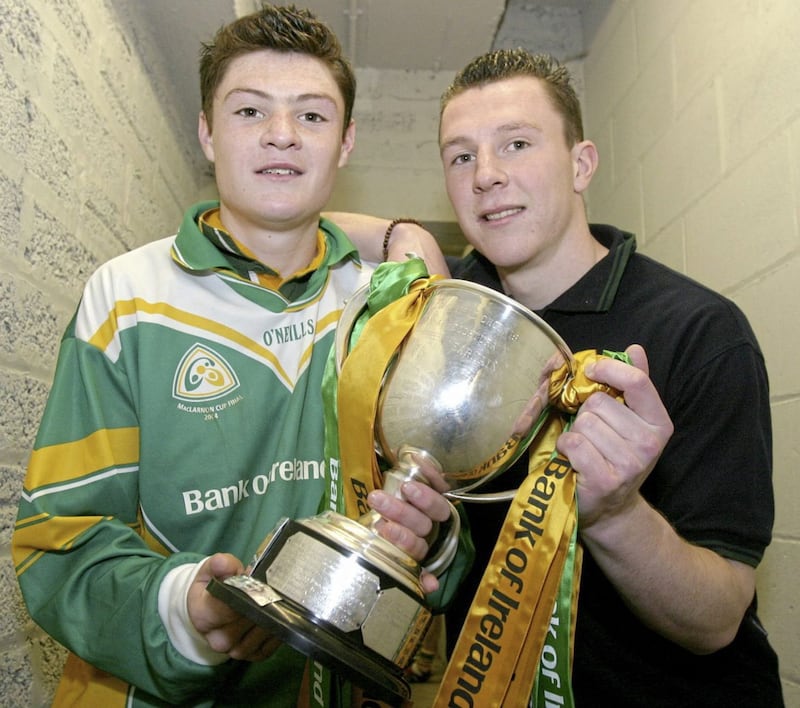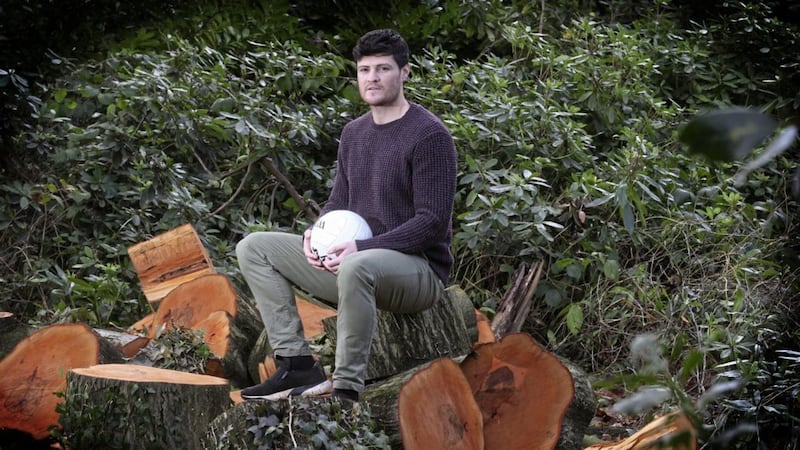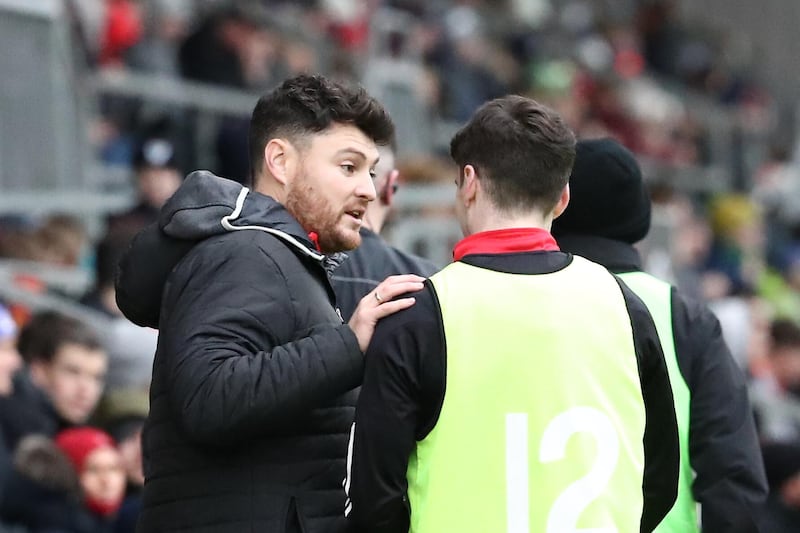“HAVE you ever considered management?”
A schoolboy superstar, an overnight success story in the hard knocks world of Aussie Rules, the returning hero when Down came from nowhere to reach an All-Ireland final, whatever Marty Clarke touched thus far had turned to gold.
At 26 years old Clarke should have been entering his sporting peak whether on this side of the world or Down Under.
Instead, he and fiancée Anna are sat in a Melbourne clinic looking into the eyes of a consultant telling him it was all over and asking about a possible future in management.
“That was how he opened it,” recalls Clarke with a shake of the head as he thinks back to that fateful day in July 2014.
For the previous four months, he had known something wasn’t right. No longer a leading light in the Collingwood first team, no more ‘Irish Nathan Buckley’ quips, Clarke was barely holding down a place in the Magpies’ reserves.
The days of being first past the post in the bleep tests, the fittest player pulling on the famous black and white guernsey, seemed like a lifetime ago. After training, Clarke was good for nothing.
During matches, the zip and panache that previously set him apart had been replaced by exhaustion and anxiety.
Some of the Collingwood fans started to turn, adding to the stress of the situation as the final months of his contract wound down. Coaches asked him daily what was wrong – he had no answer for them.
His body was trying to tell him something but, for the first time in his life, he hadn’t a clue what.
Inexplicably losing weight, feeling more and more tired, frustrated and disenfranchised, Clarke was reaching the tipping point.
“There were days over there in 2014 when I probably shouldn’t have been getting a game for the reserves, my performances were so bad. I knew it was because I was feeling so bad but I didn’t know what was wrong with me.
“I was getting heckled by Collingwood fans over the fence saying ‘go back to Ireland’ and things like that there, and it really hits you hard.
“In my head I was just like ‘what the hell is going on here?’ The managers were asking was I okay, was I homesick, what’s wrong? It looked as if I wasn’t trying. In that ruthless environment, you can’t just say ‘I am trying hard, I’m just not feeling well’.
“Thankfully then Anna, who was working in a hospital over there, she could see there were changes happening in me because I was losing the weight and seeing how despondent I was about how I was playing.
“After one game where I actually played half-decent, I went home that night and vomited heavily and Anna just said ‘right, we have to get you to the hospital here…’”
Collingwood club doctor Peter Bacquie was a welcome and willing listener. He arranged for bloods to be taken before a specialist endocrinologist performed a synacthen test which uses a special chemical to check whether your adrenal glands are producing enough of a hormone called cortisol.
His body didn’t react, and a diagnosis of the extremely rare Addison’s disease was immediately confirmed.
Yet while Anna cried, a wave of relief rushed over Clarke.
He knows this sounds bizarre. After all, Addison’s only affects one in every 100,000 people and being a sufferer meant being on medication for the rest of his life, but Clarke’s mind had been running wild in the days leading up to the consultant’s appointment.
He was just happy to be told there was nothing more sinister at play.
“I hadn’t heard of it. Anna had mentioned it before but, because it’s so rare, she didn’t think it was that. The consultant said to me ‘have you ever considered management?’ He said there’s no way you’re going to be able to keep playing with this – he couldn’t believe I was still able to play at the weekend or train.
“I was pushing myself harder and harder but the nature of the condition is that you feel completely zapped of energy. You’re losing weight but mentally I was saying ‘I need to work harder to try and get back into this team’. That’s a very stressful place to be.”
Hydrocortisone and fludrocortisone tablets must be taken every day but as soon as Clarke commenced the programme of medication, he felt like a new man. Unfortunately, it had come too late in the day.
With only two months left on the three-year contract he had inked in the autumn of 2011, Clarke knew the game was up in Oz.
“The management at Collingwood were nice, they were sort of saying ‘I’m very sorry this has happened, for pushing you and for doubting you’, but I knew my time was coming to an end.
“It didn’t matter if the doctors had been saying ‘Marty’s cured now’, my contract was up and the way I was playing, they just couldn’t have taken the risk.”

RUNNING a couple of minutes late, the phone rings.
“Hello, Neil? I’m just out there now. I’m over at the other side of the building from where you’re at but I’ll be there in 10 or 12 minutes, okay?”
“No problem, see you then.”
That was at 12.31pm. By 12.55pm he still hadn’t appeared.
“Jeez, Marty must be bad…” I thought, wrongly.
At that point Clarke appears around the side of Stranmillis College, bounding down the hill towards the main road.
“Sorry about that, I got held up in class…”
Collingwood training shirt and shorts, eyes wide, biceps popping, he looks a picture of good health. And yet here we are talking about his career in the past tense.
At the age of 29 and almost two-and-half years after returning from Australia, Clarke is bringing an end to his playing days on medical advice.
Queen’s University’s chastening 16-point defeat to Dublin City University in the Sigerson Cup at the end of January was a savage blow. Even now, over a month on, the wound is still raw.
He wouldn’t have chosen to go out that way but in recent years Clarke has had a growing sense that he was operating on borrowed time.
“With the dynamic nature of Gaelic where you’re running, you’re jumping, I was putting my body under a lot of stress.
“I just felt completely zapped from the start of the game to the finish. When I got home it was taking me longer and longer to recover.”
One episode in particular towards the end of 2015 gave Clarke a different perspective on life, and on how he viewed his illness.
“There’s a thing called an Addisonian crisis so, say I ate chicken that was bad and I got food poisoning, I’d have to go to the hospital within a couple of hours to get an injection and get cortisol into my system.
“It happened a few years back. At two o’clock I was sitting in the house and by six o’clock Anna was driving me up the motorway to Daisy Hill.
“I was green, A&E in Newry was packed, but thank God the consultant just rushed me in, grabbed my arm, didn’t even have time for a tourniquet, he just injected me and I slowly came back over the next three or four hours.
“That was so scary, but it was probably the wake-up call I needed to respect the condition. I needed that to happen.”
Last week Clarke told his club-mates at An Riocht he was finished. There was no need to inform anyone on the Down management team about his decision as a much talked about return to the red and black never quite materialised.
“I had days last summer with the Kingdom [An Riocht] where I did feel very good,” Clarke says looking back at a campaign when he helped the Kilkeel club reach a Down intermediate championship final, as well as winning promotion back to the top flight.
“The Kingdom have been first class and it was pretty emotional telling the fellas. In the Sigerson, we lost heavily to DCU and I knew myself I had put in a lot of effort over the McKenna Cup in preparation for Sigerson.
“I should’ve been at peak fitness but I was just feeling the opposite. I knew the way I was feeling on the field. And now being a father and planning a future with Anna, I don’t want something to happen on the pitch after I’ve been told ‘look, you’re putting your body under a lot of stress here’.
“So I went and got a bit of advice from the consultant and he recommended I stop competitive sport.”
As he delivers those words, you’re almost waiting on a crack in his voice or some flicker of emotion, but it doesn’t come. They are delivered completely matter-of-fact.
Marty Clarke is not one to dwell on matters beyond his control. He took time over the decision but, once made, the only way to look was straight ahead.
Now happily married to Anna and with a two-year-old daughter, Rose, Clarke is philosophical about the path his life has taken.
With a year left to go in his teaching degree at Stranmillis and an international role with the AFL helping to try and find the next big Irish star, he is already looking forward to what the future holds.
But that doesn’t mean it’s easy leaving behind something that has only ever been a force for good since those early, carefree days of running out the back door of the house to kick ball with your big brother.

“IT would be brilliant if we both played in the same Down team; there would be some amount of tickets about the house!” – Marty Clarke, Mourne Observer, March 31, 2004
A BIT like emerging young golfer Rory McIlroy at the other end of the county, Marty Clarke was being tipped for greatness from his earliest days setting foot on a football field.
In a previous post at county Down weekly newspaper, Mourne Observer, our paths first crossed almost 13 years ago.
Organising a series of features on the up-and-coming sporting talent in the area, selecting a Gaelic football subject was by far the easiest of the run.
Every couple of months in the early Noughties, photographer Pat O’Hare would arrive back at the office, coat still on, camera bag over the shoulder, waxing lyrical about this young fella he’d just seen playing for St Louis’ in Downpatrick, Belfast, Omagh or wherever.
"I’m telling you," O’Hare would say, "this lad is something else."
“I remember that alright – that was a few shaves ago,” smiles Clarke as he is reminded about the ‘Teen Spirit’ article way back when.
Much of the piece focuses on the school’s All-Ireland B Colleges final date with Portlaoise CBS five weeks later (they won, Clarke scoring 0-2) but there were a few insights into the mind of the 16-year-old rising star too.
As was the case with so many young forwards around this time, Clarke was blinded by the blonde hair and breakneck brilliance of Tyrone’s Owen Mulligan.
Closer to home though, older brother John was the one he truly aspired to be like.
Like Marty, John Clarke also won an All-Ireland minor title as part of the previous Down golden generation in 1999 and, by the time the younger sibling was beginning to make a name for himself, John was already establishing himself with Paddy O’Rourke’s seniors.
The older brother told anybody who would listen that the real star of the Clarke household was on the way, watch out.
Yet while John is still playing away with St John’s, Drumnaquoile, it is Marty who is having to call time prematurely.
As a result, those memories of the countless hours spent honing their skills around the back of the family home, overlooking the picturesque Cranfield beach at the mouth of Carlingford Lough, take on added significance.
“We had a lovely big garden around the outside and then a field over the back where dad made nets for me and John.
“It was literally after school, out there kicking with John. He’s five years older so I was always having to compete just to hold my own against him – and he wouldn’t have gone too easy on me either.
“I have so many great memories of running on the beach, doing extra training from an early enough age, probably eight or nine. By the time I was 12, 13, 14 it had become a real obsession, we had great structures round at the Kingdom, we had success every year through the grades.
“There’s just a fantastic club and culture down there. I never had a ball out of my hands until I changed it for an oval ball.”
Others may look from the outside and say Clarke could, and should, be leaving behind a greater legacy, such was his star quality between the white lines.
Clarke smiles at the suggestion that he is walking away with potential unfulfilled. Sure, he would love to have a greater haul of medals, but he achieved and experienced more than most could ever dream of.
Two MacRory Cup finals with St Louis’ Grammar, an All-Ireland minor title with Down in 2005 and a meteoric rise through the AFL ranks at just 19 before he played a central role in the Mourne county’s brief brush with Sam seven years ago, landing an Allstar for his efforts.
That’s not bad by anybody’s reckoning.
“The number one thing is what sport has given me,” he says.
“It has kind of defined me up to this point, from schools football right up to playing for Collingwood and then Down.
“It’s been an amazing journey, literally all over the world because we trained in South Africa and America for Collingwood, there was a trip away to New York to play an exhibition game with Down in 2010.
“Before I went to Australia, I had never set foot out of Ireland other than to attend the AFL trial at Loughborough university. That was it.
“I don’t have a feeling of wishing this or that, maybe I will down the line, but not now.”
In the second of our two-part feature tomorrow, Marty Clarke discusses why - despite all the talk - his return to county colours never happened








